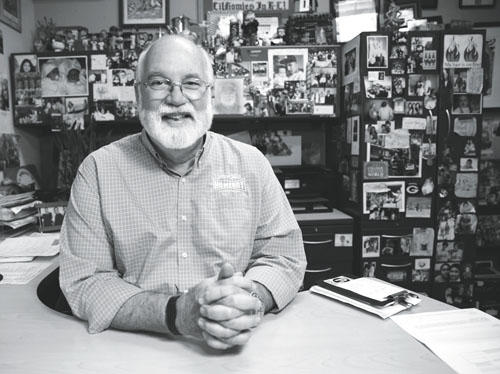In 1986, when Reverend Gregory Boyle was appointed pastor at Dolores Mission Church in the Boyle Heights neighborhood, he said “there were eight gangs at war with each other.”
Two years later, he and other community members began what would later grow into Homeboy Industries, the world’s largest gang intervention and rehabilitation program. It developed from an initiative to create opportunities for gang members. This was a novel approach to crime, since mass incarcerations were the primary tactic for dealing with gang violence at the time.

The Ukleja Center for Ethical Leadership at California State University, Long Beach is honoring Homeboy Industries Founder and Executive Director Gregory Boyle with its 2017 Nell and John Wooden Ethics in Leadership Award. Homeboy Industries is the world’s largest gang-intervention and rehabilitation program. (Photograph provided by The Ukleja Center)
Now, the Ukleja Center for Ethical Leadership at California State University, Long Beach, has selected Boyle to receive its 2017 Nell and John Wooden Ethics in Leadership Award. The community is invited to attend the celebration on November 16, from 6 to 9 p.m. at the Carpenter Performing Arts Center, 6200 E. Atherton St.
The event will include dinner and a talk by Boyle, a Jesuit priest and the executive director of Homeboy Industries, entitled “Lessons from the Field: Kinship as an Intervention.” Boyle’s new book, Barking to the Choir: The Power of Radical Kinship, will be released on November 14. He is also the author of the 2010 New York Times-bestseller, Tattoos on the Heart: The Power of Boundless Compassion.
Boyle’s initial program, Jobs for a Future, included creating an alternative school and identifying pathways to employment, according to the Homeboy Industries website. Boyle said his methods gained more attention after the 1992 Los Angeles Riots.
“Every pocket of poverty in the city ignited during the riots and ours didn’t. The L.A. Times wanted to know why,” Boyle said. “I told them we had 60 strategically hired gang members – perhaps the most likely to torch our neighborhood – engaged in purposeful activity.”
After the riots, Jobs for a Future and Proyecto Pastoral, a Dolores Mission community-organizing project, converted the abandoned bakery across the street from the church into their first business, Homeboy Bakery. Movie producer Ray Stark helped purchase it after he approached Boyle and asked how he could contribute to his cause.
“We put enemy rival gang members baking bread together,” Boyle said. “It was hard, but they had a common interest. They all wanted to have a reason to get up in the morning, and a reason not to gang-bang the night before. Once you give them that reason, they were able to rise to the occasion and work side by side. You can’t demonize people you know.”
Homeboy Industries now provides services to about 15,000 men and women. It operates other social enterprises such as Homeboy Recycling, Homegirl Café and a diner at Los Angeles City Hall. And Boyle’s approach has spread nationwide: 147 programs in the U.S. and 16 outside of the country are modeled on Homeboy Industries.
“I think Homeboy changed the metaphor,” Boyle said. “It stands for being smart on crime. The day won’t ever come when I have more courage or I’m closer to God than these folks are.”
Boyle’s accolade, the Nell and John Wooden Ethics in Leadership Award, aims to honor a person or organization that embodies “ethical behavior and visionary leadership,” according to the Ukleja Center.
Homeboy Industries will receive a portion of the proceeds from the November 16 event. Tickets are $300 for individuals. For reservations or more information, contact Jane Roeder at jane.roeder@csulb.edu or 562/985-8600.
